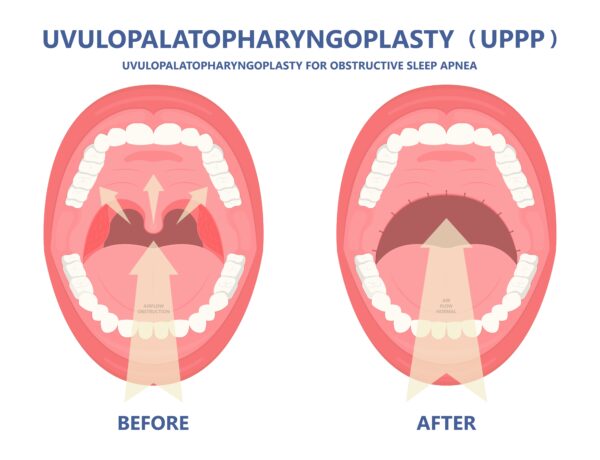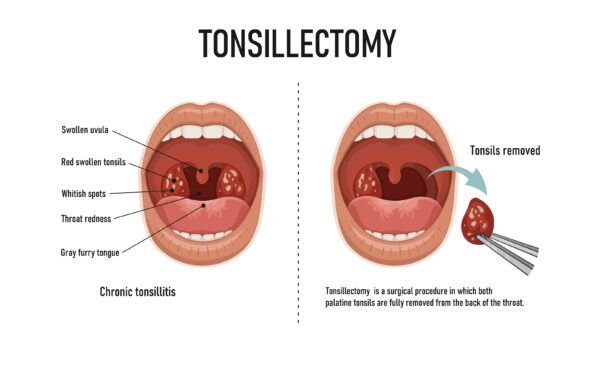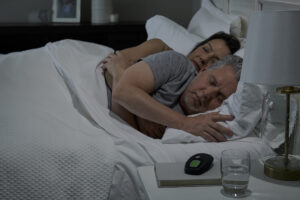
menu

Posted in Uncategorized | March 2, 2023

Sleep apnea is a serious condition that happens when you repeatedly stop breathing while sleeping. Obstructive sleep apnea (OSA) is the most common type of sleep apnea.
Obstructive sleep apnea occurs when your airway is narrowed or blocked.
For people with sleep apnea, breathing may pause for 10 to 30 seconds at a time while sleeping at night.
These breathing interruptions can happen up to hundreds of times per night. Keep reading to learn more about sleep apnea and the different kinds of sleep apnea surgeries available.
When you stop breathing due to sleep apnea, your brain detects a lack of oxygen and wakes you up just enough to breathe and fall back asleep. The cycle goes on throughout the night, preventing restful, healthy sleep.
Some of the symptoms of sleep apnea include:

When left untreated, sleep apnea can cause serious health complications like:
For this reason, it’s important to treat sleep apnea without delay.
Your ENT specialist at Specialty Care Institute may suggest the following surgical procedures if other non-surgical alternatives have had little or no success treating sleep apnea.

Uvulopalatopharyngoplasty, or UPPP, is a procedure that treats sleep apnea by removing excess tissue to widen your airway. Expanding your airway allows air to move more easily through your throat when you breathe.
In turn, this helps reduce the symptoms of sleep apnea. During your uvulopalatopharyngoplasty procedure, your ENT specialist may remove tissue from the following areas:
Your ENT specialist may also stiffen the remaining tissues with a laser, making them less likely to interfere with your breathing.
Your ENT specialist may suggest a uvulopalatopharyngoplasty if:
Recovery from a uvulopalatopharyngoplasty procedure typically takes 2 to 3 weeks. During this period, your throat will be sore, and you may have trouble swallowing.
You can manage any soreness and discomfort with pain medication.

Tonsils are the two round soft tissue masses found at the back of your throat. They’re part of the immune system.
Your tonsils trap viruses and bacteria that enter your nose or mouth, preventing infections. Sometimes, tonsils can become enlarged.
Swollen tonsils are more common in children, although it’s still possible in adults. A tonsillectomy is a surgical procedure done to remove oversized tonsils blocking your airway.
Removing enlarged tonsils clears airway obstruction, improving breathing and other sleep apnea symptoms in children and adults. Full recovery after a tonsillectomy takes approximately two weeks, though it can vary depending on the patient.
Your ENT specialist may recommend a tonsillectomy for you or your child if you have enlarged tonsils that cause sleep apnea symptoms or worsen them.
The hypoglossal nerve controls your tongue muscles. To treat sleep apnea, a hypoglossal nerve stimulator works inside your body with your natural breathing process.
The FDA-approved device is implanted in your chest under the skin and connected to two wires. One wire detects the start of every breath.
As you breathe in, this wire signals the other wire to stimulate your hypoglossal nerve. Mild stimulation prevents your tongue from relaxing and blocking your airway.
The stimulation helps keep your airway open while sleeping, helping to alleviate sleep apnea symptoms.
To operate the device, you click a tiny remote to turn the hypoglossal nerve stimulator on before sleeping and turn it off when you wake up.
Using a hypoglossal nerve stimulator can be suitable if you:

Maxillomandibular advancement (MMA) is a type of skeletal procedure performed as a treatment for sleep apnea. Your ENT specialist may recommend maxillomandibular advancement if you have structural problems with your jaw or other facial bones.
The surgical procedure involves repositioning the upper jaw (maxilla) or lower jaw (mandible) to open the upper or lower airway. For some patients, the upper and lower jaw are opened in the same procedure to increase space in the upper and lower airway.
Opening the airway improves sleep apnea and its symptoms. Maxillomandibular advancement surgery has a fairly high success rate.
About 98 percent of patients who undergo the procedure sleep better and have a better quality of life.
You may be a candidate for maxillomandibular advancement if:
Palatal surgery can be beneficial if your sleep apnea is caused by lax tissue in your soft palate. In palatal surgery, loose tissue in your soft palate is reduced, repositioned, and sometimes removed.
Palatal surgery aims to keep your airway open while you sleep by removing obstructions caused by the soft palate. Removing soft palate obstructions helps you breathe easier at night and effectively reduces other sleep apnea symptoms.
Your ENT specialist may recommend palatal surgery if:
Generally, your anatomy will determine whether you’re a good candidate for palatal surgery.

Inspire Therapy is an FDA-approved treatment for sleep apnea. This innovative treatment uses an implanted device to ensure your airway remains open while you sleep, significantly reducing sleep apnea symptoms.
During the minimally invasive outpatient procedure, your ENT specialist will create two tiny incisions, one in your upper right chest and the other under your chin, where the hypoglossal nerve lies.
Next, they will insert the Inspire device through the incisions under your skin. About a month after your procedure, you’ll visit your ENT specialist to activate Inspire.
Approximately two months later, you’ll undergo a sleep study to allow your doctor to optimize control of your sleep apnea and adjust Inspire to your comfort.
You’ll go for checkups once or twice annually. Inspire has a battery that lasts about 8 to 10 years. Replacement is performed in an outpatient procedure to remove and replace the central unit.
When turned on, Inspire delivers mild stimulation to the hypoglossal nerve, which controls your tongue movement and surrounding muscles in the airway.
To activate Inspire, turn it on using a small hand-held remote once you’re in bed. Then, turn Inspire off when you wake up.
Inspire could be right for you if you:

Surgery at Specialty Care Institute is an effective treatment for sleep apnea if other treatment options have not worked. Our team of extensively experienced specialists at Specialty Care Institute is committed to recommending the best techniques to resolve your sleep apnea.
Do you have sleep apnea? Schedule your appointment today at Specialty Care Institute in Arlington Heights, Barrington, Elgin, or Hoffman Estates, IL, to find out which sleep apnea surgery could be right for you.